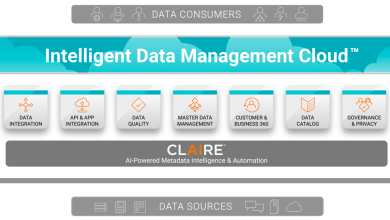SAS Innovate: Data Regulations, Governance and the Road to Responsible Innovation

The digital age has ushered in a relentless torrent of data, a powerful resource that fuels innovation and drives progress. However, this very power necessitates a critical responsibility: Ensuring its ethical and responsible use. This is where data governance and data management play an important role as the architects who design the secure and trustworthy foundation upon which the future of data-driven endeavours rests.
Data governance transcends mere technical considerations. It establishes the guiding principles, policies, and procedures that dictate how data is collected, stored, accessed, and ultimately utilised. Without a robust data governance framework, organisations navigate a minefield of potential pitfalls. Sensitive data could be exposed, regulatory compliance could lapse, and the integrity of data-driven insights could be compromised.
This lack of proper data governance is akin to building a house on a foundation of sand. The structure might appear sound initially, but any significant stress – a regulatory change, a data breach – could cause the whole thing to crumble. Effective data management, the meticulous execution of data governance principles, ensures data accuracy, accessibility, and usability. This translates to building on a solid foundation – clean, well-labelled, and fit-for-purpose data – that empowers organisations to extract reliable insights and develop trustworthy AI solutions.
In this dynamic landscape, navigating the complexities of data governance requires a nuanced understanding of evolving regulations. Privacy laws, data protection acts, and industry-specific regulations all present unique challenges. Understanding these complexities and tailoring data governance strategies accordingly is paramount for organisations seeking to maintain a competitive edge in the digital age.
 Kalliopi Spyridaki, Chief Privacy Strategist for EMEA and Asia Pacific at SAS, offers valuable insights into these intricacies. During an interview with Data and Storage ASEAN at the recent SAS Innovate event in Singapore, she agreed to share the challenges and strategies for effective data governance and management, with an aim to guide organisations through the intricate web of regulations and ethical considerations that define this ever-evolving domain.
Kalliopi Spyridaki, Chief Privacy Strategist for EMEA and Asia Pacific at SAS, offers valuable insights into these intricacies. During an interview with Data and Storage ASEAN at the recent SAS Innovate event in Singapore, she agreed to share the challenges and strategies for effective data governance and management, with an aim to guide organisations through the intricate web of regulations and ethical considerations that define this ever-evolving domain.
The Challenges of Diverse Regulations
Organisations in the Asia Pacific (APAC) face a complex data landscape due to a rapidly evolving regulatory environment and diverse legal frameworks across the region. Despite the regional variation, these regulations often present common challenges related to data management and governance.
One of the primary challenges in the APAC region is the sheer volume and diversity of data-related laws. Different government departments with varying priorities and visions often draft these laws, leading to inconsistencies and complexities in implementation. This fragmentation requires organisations to be adaptable and versatile in their compliance efforts.
“The volume and the diversity of the laws is probably a major challenge,” Kalliopi acknowledges. “For global companies like SAS, this necessitates a versatile approach to meet the regulatory requirements of each country while maintaining a cohesive global data strategy.”
A Unified Approach to Data Strategy
To navigate these complexities, the senior figure at SAS emphasises the importance of starting with a robust data strategy. This involves establishing solid data management practices that can be adapted to comply with different regulatory frameworks. “What we need is to start with our data strategy and have robust data management in place so that we can adapt the data governance rules on the basis of what each regulation requires,” she advises.
This broader data governance strategy, which incorporates regulations, offers a two-fold benefit for organisations. First, it facilitates compliance by ensuring alignment between data practices and regulatory requirements. Second, it enables companies to derive business benefits and maintain a competitive advantage. Streamlining their efforts and reducing the burden of meeting diverse regulations allows organisations to focus resources on innovation and unlock the full potential of their data.

Compliance, on the other hand, is an ongoing journey, according to Kalliopi and achieving 100% compliance is often unrealistic. However, she points out that going beyond mere compliance can create significant business advantages by building trust with customers. “Trust is created not just because you have to, not just because you have the obligation to do something, but because it is the right thing to do,” she asserts.
This trust, built on a foundation of ethical data practices and transparency, can drive innovation. The Chief Privacy Specialist highlights examples from SAS, such as the development of synthetic data and model cards, which address ethical and regulatory concerns while fostering innovation. “Well thought through and well-consulted regulation can actually help innovation because of the trust element, because of the legal certainty that it creates,” she explains.
The Virtuous Circle
The perceived trade-off between innovation and regulation is a common concern. However, Kalliopi believes that thoughtful regulation can support and even enhance innovation. When you have a clear and predictable framework, regulations can then create an environment where businesses feel confident to innovate, knowing the boundaries and fostering responsible development.
At SAS, initiatives like the SAS Data Maker and the SAS Viya Workbench exemplify how regulatory requirements can drive innovation. These tools, designed to enhance transparency, fairness, and accountability in AI, are not only regulatory compliant but also provide significant business value. They empower organisations to develop trustworthy AI solutions while adhering to evolving regulations.
This focus on responsible innovation extends beyond internal tools. Kalliopi emphasises the importance of partnerships between large companies and smaller enterprises. These collaborations can facilitate knowledge sharing and accelerate innovation, particularly for smaller companies that might lack the resources to navigate the regulatory landscape alone. “Bigger companies like us are very willing to help and work with smaller companies because of the innovation element that they bring,” she says.
Thus, fostering a collaborative environment is crucial, as the entire industry can benefit from responsible data practices and advancements.
What to Look for in the Future
Looking ahead, SAS’s Chief Privacy Specialist identifies several emerging trends in AI policy and privacy regulations. While privacy regulations have largely followed a model inspired by the European framework, AI regulations are still in their formative stages. The EU’s AI Act, which is expected to have a global impact similar to the GDPR, sets a precedent that other regions may follow.
However, she notes that there is not yet clear consumer demand for AI regulations, unlike privacy regulations, which were driven by consumer concerns about data collection and use. “There is not yet any consumer demand for a framework because of the breadth of the technologies, because of the fact that despite the breadth, we don’t really always see the applications in most countries,” she explains. As AI technology continues to evolve and permeate more aspects of our lives, consumer awareness and potential demand for regulations are likely to increase.
All in all, navigating the complex landscape of data governance and data management requires a strategic approach that balances regulatory compliance with innovation. It’s a continuous journey, but by embracing robust data management, adaptable strategies, and the potential of well-designed regulation, organisations can transform compliance challenges into springboards for growth and innovation.
As data laws continue to evolve, those who prioritise responsible data practices will be well-positioned to thrive in the dynamic digital age.




